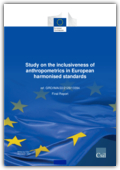
The project focused on European harmonised standards and the diversity of human bodies. While these standards are intended to ensure the safety and usability of products, they often fall short in considering variations in human size, structure, and composition. Through a comprehensive study conducted for the European Commission, the research aimed to shed light on the extent and implications of this non-inclusiveness. The ultimate goal was to contribute to the creation of safer, more accessible, and more inclusive products for the entire European population.
To this end, the team developed a methodology involving desk review, interviews, and web scraping and applied it to a pre-defined set of hENs. The methodology involved analysing 2,650 European standards supporting 22 pieces of legislation. During two stakeholder workshops, the team discussed with experts the validity of standards’ prioritisation and the needs and challenges for a possible update of two standards with high priority.
Findings revealed that anthropometric measures are relevant for 36% of these standards, yet many fail to adequately address all dimensions of human diversity. Specifically, for 76 standards, the potential impact of non-inclusiveness on human health and safety was assessed as high, signalling an urgent need for revision.